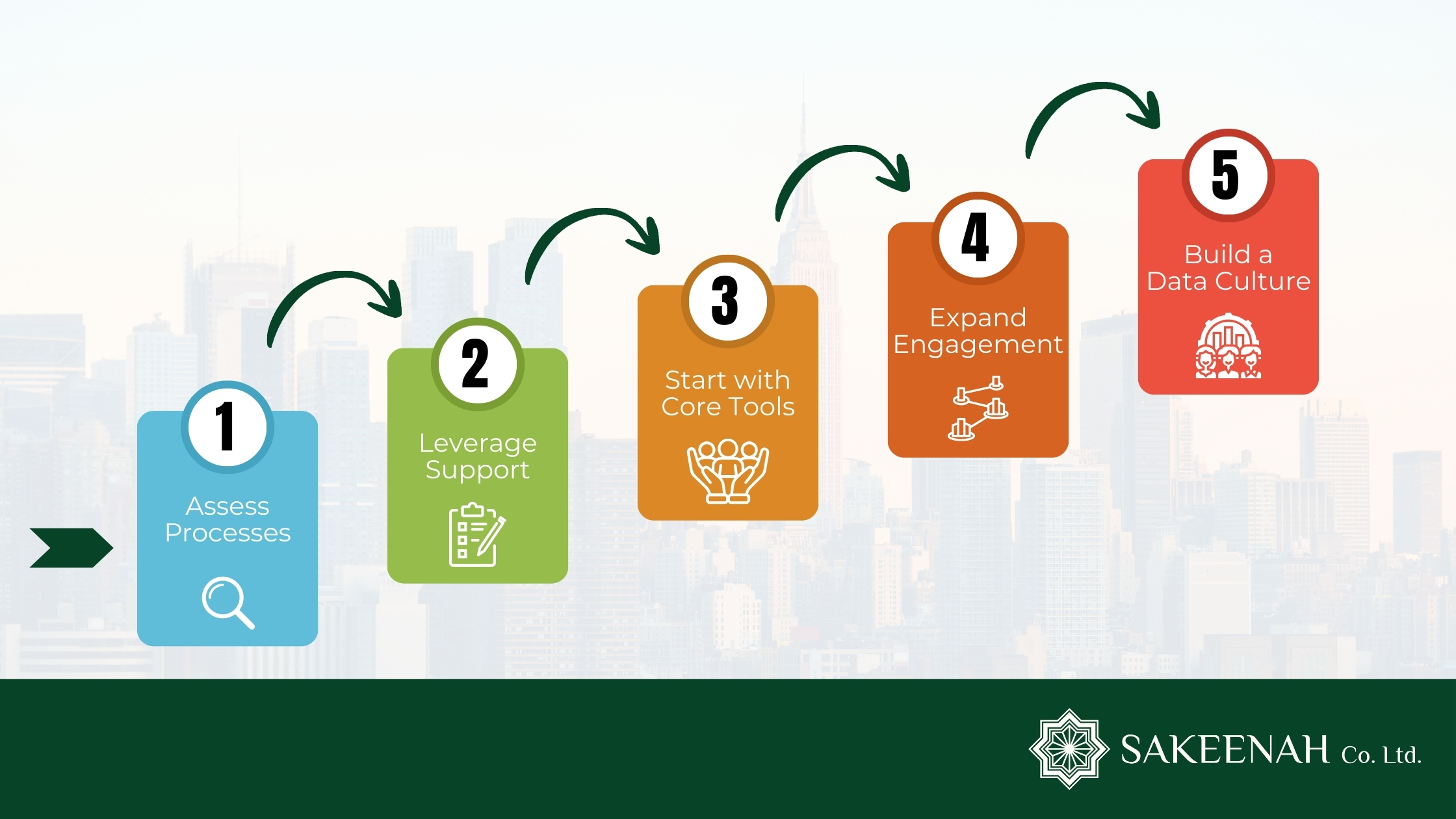Digital Transformation for SMEs in Mauritius: A Practical Roadmap

Introduction
Small and medium-sized enterprises (SMEs) form the backbone of the Mauritian economy, contributing nearly 40% of GDP and employing more than 50% of the workforce (Statistics Mauritius, 2023). They range from small family businesses to growing firms in tourism, trade, retail, and services.
Yet, despite their importance, many SMEs remain under-digitalised. Processes are still manual — overly reliant on paper, Excel, or WhatsApp. While this may have worked in the past, today’s business environment, shaped by global competition, rising costs, and evolving customer expectations, demands something different.
Digital transformation is no longer optional. It is a necessity for SMEs to stay competitive, resilient, and profitable.
The good news? The Mauritian government has created supportive schemes — including the SME Technology and Innovation Scheme (TINS) and the Human Resource Development Council (HRDC) Training Support — which significantly reduce the financial burden of adopting digital solutions.
This article provides a practical roadmap for SMEs in Mauritius to start their digital journey, based on Sakeenah Group’s consulting experience.
Why SMEs in Mauritius Struggle to Go Digital
Before diving into the roadmap, it’s important to understand the barriers SMEs typically face:
- Cost Concerns - Many SMEs assume that digitalisation requires massive IT investments.
- Lack of Expertise - Owners often don’t know what solutions to adopt or how to implement them.
- Change Resistance - Staff may be hesitant to change “the way things have always been done.”
- Fragmented Solutions - Using unconnected apps for invoicing, bookings, or payroll creates inefficiency instead of solving problems.
This is where a structured, step-by-step approach with the right funding support becomes essential.
The Path to Digital Transformation

Step 1: Assess Current Processes
The first step is always understanding where you are.
- Identify where manual processes dominate (paper invoices, handwritten bookings, WhatsApp confirmations).
- Map workflows in sales, finance, operations, and HR.
- Highlight “pain points” such as lost bookings, missed servicing deadlines, or poor visibility on cash flow.
Example: A car rental SME in Mauritius was relying on WhatsApp to confirm reservations, with Excel for tracking rentals. Errors were common, compliance deadlines were missed, and management had no clear overview of performance.
Step 2: Leverage Government Support
Mauritius offers concrete support to SMEs willing to modernise.
- Technology and Innovation Scheme (TINS)
-
- Helps fund part of the investment in digital tools and systems.
- Covers solutions like booking platforms, CRM systems, and accounting integrations.
- Requirement: The company must hold a valid SME Certificate. Renewal should be done promptly to remain eligible.
Find more details at https://www.smemu.com/schemes/ .
- HRDC Training Support
-
- Covers the training of staff to ensure adoption of digital systems.
- Without training, even the best system fails. This scheme ensures employees gain confidence in using the new tools.
Find more details at https://www.hrdc.mu/index.php/training-grant-system/ntf.
Step 3: Start with Core Digital Tools
Once funding is secured, SMEs should begin with the most essential systems and focus on solving immediate pain points such as:
- Bookings & Reservations: Invest in Cloud-based solutions (like AppSheet-powered apps) to replace WhatsApp and Excel.
- Payments: Integrate with MCB Gateway API or other payment providers for seamless transactions.
- Compliance Alerts: Implement automated reminders for servicing, insurance renewals, and license expiries.
- Basic Reporting: Invest in digital dashboards that track income, expenses, and profit per product/service line.
Example: Sakeenah Group helped a Mauritian car rental SME implement an AppSheet-based solution to digitise vehicle records, customer data, compliance alerts, and rental contracts. Within weeks, operational errors reduced, and management gained a real-time overview of revenues and costs.
Step 4: Expand to Customer Engagement
Once core systems are in place, SMEs should shift focus to customer-facing enhancements, such as:
- CRM Systems: Capture customer data (name, email, purchase history) and track repeat clients.
- Facebook Integration: Enable direct bookings through social media — meeting customers where they are.
- Customer Apps: Eventually provide a mobile app for customers to manage bookings, payments, and loyalty points.
- Loyalty Programs: Reward repeat clients and cross-sell other group services (restaurants, retail, beverages, etc.).
Practical Example: A hospitality SME could offer loyalty points redeemable not just at their hotel but also across affiliated restaurants and beverage brands — deepening customer relationships.
Step 5: Build a Data Culture
Digital transformation is not just about tools; it is about discipline.
- Staff must log data consistently (fuel usage, mileage, invoices).
- Managers must review dashboards regularly to spot trends.
- Data quality must be treated as a strategic asset — poor input = poor insights.
At Sakeenah Group, we emphasise that “system quality is data quality.” A digital system will only deliver value if the organisation commits to accurate, timely data capture.
Case Study: Car Rental Digitalisation (Mauritius)
One of Sakeenah Group’s recent projects involved guiding a local car rental SME through its first, crucial steps into digital transformation.
The Challenge: Growth Hindered by Manual Processes
The business was successful, but its operational processes were struggling to keep up. They faced a trio of common, yet critical, challenges:
- Booking Chaos: All reservations and client communications were handled via WhatsApp. This led to a constant stream of missed messages, lost booking details, and frustrating double-bookings that damaged customer relations.
- Financial Fog: Vehicle rentals and expenses were tracked manually in Excel spreadsheets. This method was not only time-consuming but also prone to human error, resulting in frequent invoicing mistakes and an unclear picture of profitability.
- Compliance Risks: Critical deadlines for vehicle insurance renewals, servicing schedules, and driver permit validity were often overlooked, exposing the business to unnecessary legal and financial risks.
The Solution: A Centralised, Proactive System
We collaborated with the client to develop a streamlined digital solution built on AppSheet, a platform that allows for rapid development of powerful custom applications. The goal was not to reinvent the wheel, but to create a single source of truth for the entire operation.
The solution included:
- A Central Management Hub: The AppSheet application became the core of the business, providing a unified dashboard to manage the vehicle fleet, customer database, and all rental bookings.
- Automated Alerts: We configured an automated notification system to send alerts for upcoming servicing dates, insurance renewals, and driver permit expiries, effectively eliminating compliance oversights.
- Insightful Reporting: The app was designed to generate simple yet powerful reports, allowing management to see revenue versus costs for each individual vehicle at a glance.
- Future-Proofing Payments: We began exploring the integration of the MCB Juice Gateway API, laying the groundwork for a seamless and secure online payment system for future implementation.
The Results: Measurable Impact and a Foundation for Growth
The impact of this targeted digital intervention was immediate and clear.
- Operational Efficiency: The central booking system dramatically reduced administrative errors, eliminating double-bookings and ensuring no customer inquiry was ever lost.
- Financial Clarity: With accurate, real-time data, management gained a precise understanding of their financial health and could identify which vehicles were most profitable.
- A Platform for the Future: Perhaps most excitingly, this new digital foundation has opened up new strategic possibilities. The client is now positioned to develop an integrated loyalty program, connecting their car rental service with the group’s other ventures in the restaurant and beverage industry.
Overcoming Resistance to Change
A new tool is only effective if your team uses it. Employee pushback is unfortunately a common barrier in Mauritian SMEs, but it can be managed with the right leadership.
Success depends on three key actions:
- Communicate the Benefits: Clearly explain how the new system will make everyone's job easier by reducing tedious paperwork, preventing errors, and improving customer service.
- Provide Training: Empower your team by investing in proper training. In Mauritius, support from the HRDC can make this more accessible for SMEs.
- Celebrate Early Wins: Showcase initial successes to build positive momentum and demonstrate the value of the change to the entire team.
Ultimately, digital transformation is about shifting your company’s mindset and culture towards growth and efficiency.
The Road Ahead for Mauritian SMEs
Global trends are clear:
- Customers expect seamless digital experiences.
- Governments are pushing for compliance and transparency.
- Competitors adopting AI, automation, and digital tools will outpace those who don’t.
For Mauritian SMEs, the window of opportunity is open. With funding support, affordable technologies, and consulting guidance, transformation is not only possible — it is necessary.
Conclusion
Digital transformation is a journey, not a one-time project. For SMEs in Mauritius, it represents the difference between stagnation and growth, vulnerability and resilience, survival and leadership.
With government schemes like the Technology and Innovation Scheme (TINS) and HRDC training support, the financial risk is minimal. What matters most is commitment to change and the right consulting partner.
At Sakeenah Group, we help SMEs take the first steps confidently — mapping processes, securing funding, training staff, and delivering measurable impact.
Swadeck Taher OSK is a Chartered Accountant (ICAEW) and a Chartered Marketer (CIM) running businesses and coaching, consulting, mentoring CEOs and entrepreneurs ranging from startups through family businesses to established top 100 companies in Mauritius. He enjoys sharing the expertise he developed over the last thirty years at senior leadership/directorship level with his clients, business partners and other budding entrepreneurs.
Swadeck is also a GTD Practitioner and a Certified GTD Trainer. He helps others experience what the Productive Experience feels like and how they too can savour stress free productivity.
Sakeenah Co Ltd is the only Certified International Partner of the David Allen Company in Mauritius.
GTD® and Getting Things Done® are registered trademarks of the David Allen Company.
Disclaimer: All images are copyright to their respective owners. If any of the images used in this article belongs to you and you wish these removed, please send me a message and I shall oblige.
Join Our Mailing List
For receiving our news and updates in your inbox directly.


